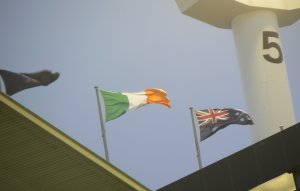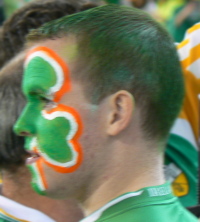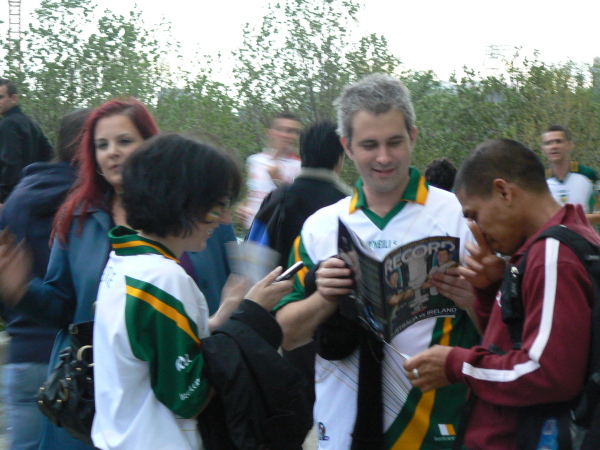International Rules Footy defeats the Cliches... Ireland 57 d Australia 53
- Saturday, November 01 2008 @ 01:40 pm ACDT
- Contributed by: Stephen Alomes
- Views: 5,926

 Final Scores: Ireland 4.8.9 (57) d Australia 3.8.11 (53)
Final Scores: Ireland 4.8.9 (57) d Australia 3.8.11 (53)Ireland defeated Australia comfortably, although finally on the scoreboard by 4 points, in the second Test at the MCG, taking home the Cormac McAnallen Cup, after winning the Perth Test by one point a week earlier.
The historic record of international matches played is now 15 wins Ireland, 14 Australia and two draws.
Kade Simpson won the Jim Stynes Medal as Australia's player of the tournament, while Graham Canty was the winner of the best Irish player in the series.
Two last quarter overs by the strong marking Drew Petrie brought Australia close to the Irish with only minutes to play.
The game was a success on the field, despite the media critics and despite the showers which have greeted both games. Beyond the Clichés
The game also transcended the clichés. The media and some footy supporters have a simple view of sport. Whether the game is old or the game is new it can all be summed up in a few recurring stories, or themes, or perhaps just clichés.
Therefore, the clichés included:
- The Irish would go out ahead early and the Australians would come back in the last quarter due to superior fitness.
- The Australians could not ever get the ball in the net for an ‘Under’, worth 6 points.
- There was little public interest.
- The game is not interesting to watch due to lack of heavy tackling.
- Finally, as with the cricket, that the world’s leading sporting nation, Australia (Oi Oi Oi optional) will always prove stronger, and will win, as the professionals would run all over the amateurs
In a most exciting game at the MCG last night, every cliché fell except for a couple of media and old footy fogey clichés.
In the opening stanza, it was the Australians who scored the first few overs, going out to an early lead of 15-6.
It was in the third quarter – the premiership quarter – that the Irish took the game by the scruff of the neck and went to a strong lead, although moderated by Australia's first goal of the series, a scrambled score to Carlton's Marc Murphy.
However, the Irish then fell into a defensive game in the last quarter and the Australians gradually came back. Crucial was their new found ability to score unders as a phalanx of players battled their way to the goal mouth and then a deft sidestep and shot by Burgoyne gave Australia another 6 pointer. Ireland responded but another to Petrie meant the final minutes would be an exciting battle, with the visitors hanging on.
To someone who, like most people, has seen most matches on television, what was interesting was the excitement of the game when seen live.
That had several components. One was the sheer speed of the game, perhaps the fastest form of football on the Earth unless the original Gaelic Football is faster.
Another, surprising given the Australian Football criticisms of a game without full-on tackles (only bumps and retarding tackles), was the genuine physical contests, both in marking and in tackling running players.
There were also high mark attempts, including by Jared Brennan and Dale Thomas.
The deft skills of the Irish were amazing, as they passed, soccered and tapped the ball. It may have been the significantly white jumpers but a team that looked like it was carrying a little more weight around the midriff than the Australians had an astonishing turn of speed and rapid reflex responses as the players evaded a tackle or laid the ball off just before being tackled.
The skills resemble, but perhaps surpass, the handball skills of the top AFL teams and it would not be surprising to see a Dale Thomas or a Shaun Burgoyne replicate some of the taps in regular matches next year.
Off the field and into the future
Off the field it seemed that all of young Irish Melbourne was at the game, with vocal support for the Irish as loud as that for the Australians from amongst the 42,823 crowd. Never has Melbourne seen so many Irish county tops from the different GAA teams, along with footy followers wearing their AFL club guernseys.
 As the AFL site remarked the crowd mixed ‘passion and merriment’, and all Irish mobiles seemed to be in use to send the news back home after the final siren.
As the AFL site remarked the crowd mixed ‘passion and merriment’, and all Irish mobiles seemed to be in use to send the news back home after the final siren.When, on the tram back from the game, a couple of young girls wearing Aussie flags with a decorative knot tied like a scarf chanted ‘Aussie Aussie Aussie’, it seemed only fair that the Irish young boys replied ‘Loss Loss Loss’.
The game did matter, as could be seen from the way the players threw themselves at the ball and the crowd roared as goals were scored.
It also seemed that national hubris (overweening pride) is losing its front row seat at international sport as is also evidenced by the fall of the once invincible, and self-confident, Australian cricket team in India over the last two matches.
Despite the doubters, whom this observer views as myopic hacks and unimaginative old fogeys, the same ones who neither knew nor cared about the International Cup in August, the game was a great success.
As reflected on in one of the interesting articles in the Football Record by Robert DiPierdomenico, who became a cult figure in Ireland when he played for Australia, the game catches the emotions.
However, for it to become an invented tradition which has a ritual place in the sporting calendar it needs continuity, something for which Australian coach Mick Malthouse has argued.
The competition resumes with the next two Test series in Ireland in October next year.
2nd Test details
Australia 0.4.3 (15) 0.5.6 (21) 1.6.9 (33) 3.8.11 (53)
Ireland 0.3.3 (12) 2.6.6 (36) 3.8.8 (50) 4.8.9 (57)
GOALS (6 points)
Australia: Burgoyne, Murphy, Petrie
Ireland: Coulter 2, Donaghy, McGinley
OVERS (3 points)
Australia: Petrie 2, Wells 2, Brennan, Brown, Burgoyne, Osborne
Ireland: Cavanagh 4, Bradley, Coulter, Donaghy, Finlay
BEST
Australia: Crowley, Simpson, Boyd, Harvey, Petrie
Ireland: Canty, Coulter, Cavanagh, Glynn, Bradley



 RSS news
RSS news Twitter
Twitter Facebook
Facebook